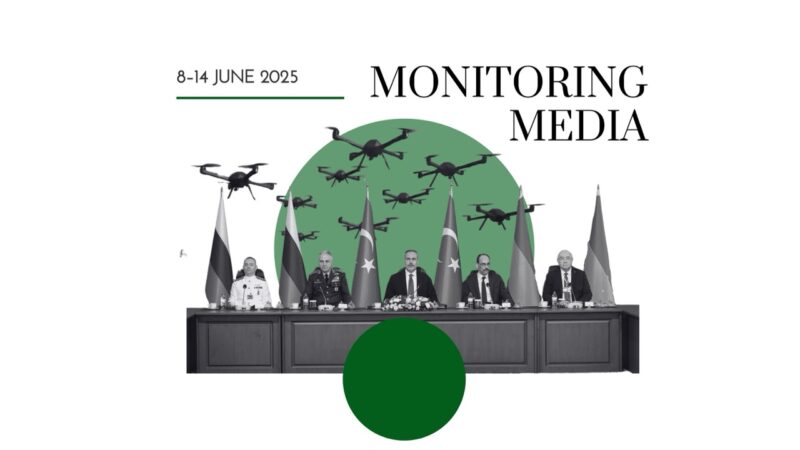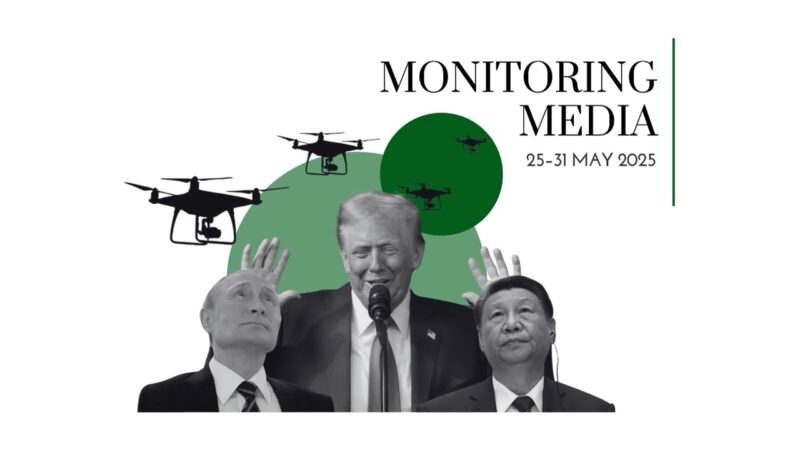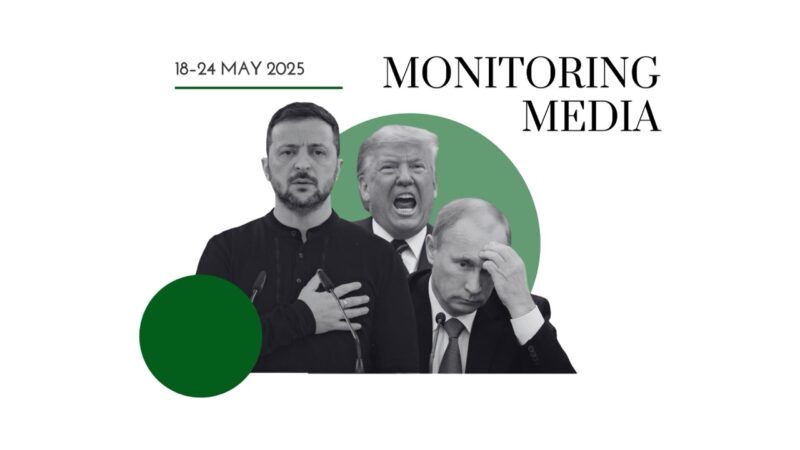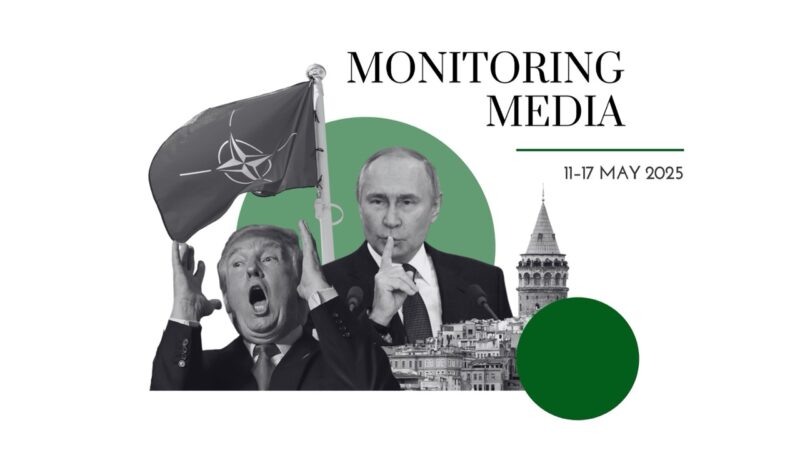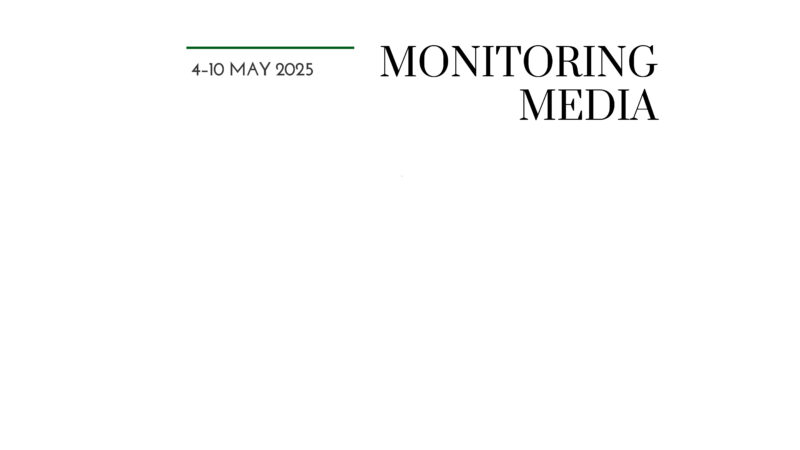Weapons procurement for Ukraine highlights problems in Canadian defence capabilities

CIUS report on Canadian media coverage of Ukrainian affairs, 1–14 January 2023
Five media outlets — The Globe and Mail, Winnipeg Free Press, Toronto Star, Le Journal de Montréal, and Le Journal de Québec — were surveyed to prepare this report on how the situation in Ukraine and Canada’s role in the war have been portrayed in Canadian media during the first two weeks of 2023. The sample of publications was selected based on their impact on public opinion as well as their professional reputation, popularity among readers, and topical relevance.
This analysis reviews only original reporting about Ukraine produced by the selected publications in the past fourteen days. It covers texts from special sections on Ukraine, paper editions of the magazines, and opinion columns and editorials.
Key messages:
- The West needs to keep supporting Ukraine with military aid;
- Defence procurement for Ukraine, Europe’s energy crisis highlight Canada’s problems at home;
- Canada can set an international example by stepping up in the prosecution of Vladimir Putin and Russia’s war crimes in Ukraine.
Main topics:
Kremlin keeps using Wagner mercenaries in Ukraine and elsewhere. Menaka Raman-Wilms (Globe and Mail) spoke to Sean McFate, a senior fellow at the Atlantic Council and author of The Modern Mercenary: Private Armies and What They Mean for World Order about the Wagner mercenary group, which has been accused of war crimes in Ukraine. McFate explains the Kremlin’s reliance on the mercenary organization that works for Russia but is not considered a legal entity. He adds that both Russian President Vladimir Putin and his close confidant Yevgeny Prigozhin (who is linked to Wagner) deny any connection to the group. “Putin’s legacy is to recreate the Russian empire,” McFate explains to the author. “He’s taken great steps in recent years, most notably in Ukraine, to try to resurrect the superpower that was the USSR, not under some sort of communist ideology but under, like, Czar Putin. He likes mercenaries because they give you plausible deniability. So if things go badly someplace or you want to commit human rights abuse as a policy, if they get caught, you can always back away and say, well, we don’t know who those Russians are. And as absurd as that sounds, it kind of works.”
Europe proves that life without Russian oil and gas is possible. Eric Reguli (Globe and Mail) argues in his opinion piece that “other than outright victory in Ukraine, there is nothing the Russian President wanted more than to see his weaponization of energy make Europe freeze in the dark.” Against the odds that crippling oil and natural gas prices would inflict deep economic pain, Europe has shown that it can withstand Russia’s energy blackmail.
Despite natural gas prices still being rather high, they have plummeted since their August peak; and in the past month alone they fell by half, according to Reguli. Thus, “Putin’s energy war against Europe, like his war against Ukraine, is not going to plan.” Reguli also points out that German chancellors Gerhard Schroeder and Angela Merkel “were wrong” when insisting that “the mighty German economy could not thrive without the seemingly endless supplies of [Russian] cheap energy.”
“Now that Europe has proven it can live without Mr. Putin’s oil and gas, it seems unlikely that Russian energy will ever again play a big role in the European energy mix—a huge revenue loss for the Kremlin and its effort to weaken the resolve of NATO countries, most of them European, to send weapons to Ukraine,” Reguli writes.
Weapons procurement for Ukraine highlights problems in Canadian defence capabilities. Lee Berthiaume (Canadian Press/Toronto Star) opens his article with a statement that “the federal Liberal government’s plan to buy anti-aircraft missiles for Ukraine is prompting questions about why such equipment isn’t being bought for the Canadian Army.”
Berthiaume notes that the Canadian Armed Forces have been without weapons to defend its troops from enemy aircraft, rockets, and drones since the last of its anti-air weapons were retired over a decade ago—in 2012. He argues that the need for anti-air defence “is particularly relevant now, as the Canadian military prepares to deploy more soldiers and equipment to Latvia,” where Canada is leading a NATO battle group charged with defending Eastern Europe from Russia. Berthiaume quotes retired lieutenant general Marquis Hainse, who says that “the war in Ukraine has highlighted a number of different gaps in the Canadian military’s capabilities, including the need for air defences.”
The author concludes by quoting Guy Thibault (former vice-chief of the defence staff), who explains that in the past, Canada had had legitimate reasons for not buying a ground-based air defence system for the military. This included “the lack of a clear threat, other priorities, and Ottawa’s emphasis on made-in-Canada content and economic benefits.” However, Thibault believes that this has changed since the 2022 full-scale invasion of Ukraine: “And as a significant partner in NATO, I think it’s rather shameful that we couldn’t provide these kinds of capabilities, or that we’re not in a position to provide more capacity to contribute to the alliance’s defence and deterrence mission in Europe.”
Stopping democratic expansion in Russia’s near-abroad is Putin’s fundamental priority. Olivia Ward (Toronto Star) argues in her opinion piece that it was Europe, not NATO, which motivated Ukrainian protests back in 2013/14 as well as the backlash that followed and ultimately the war that is devastating Ukraine today. After the Euromaidan Revolution prompted pro-Russian President Viktor Yanukovych to flee Ukraine, Russia’s President Vladimir Putin moved in to illegally annex Crimea. And after eight unsuccessful years of fighting, he still aims to erase Ukraine’s existence as an independent country, if not altogether as an organically democratic cultural entity.
Ward reminds readers of this recent history, which some in the West have forgotten, “awash in Putin’s propaganda that his ‘special military operation’ was the inevitable result of NATO aggression and its determination to dominate and weaken Russia.”
“They believe that conceding that Ukraine will never join NATO, and that the military alliance will admit no new members, will bring about an end to Putin’s aggression and illegal dismemberment of Ukraine,” she writes, warning that the West should have no illusions about Putin’s long-term strategic goal of stopping democratic expansion—in Ukraine and the rest of the region.
She also warns that Putin’s insistence that his brutal invasion of a sovereign country being “an existential war against a rapacious military alliance has become a propaganda pillar … within Russia”; indeed, it has also found some traction among Westerners who naїvely look for an exit from “a seemingly open-ended conflict.”
Ward concludes with an explanation: “For Putin, a European Ukraine did not threaten a Western military invasion but [rather] a declaration of democracy in a country bordering his increasingly authoritarian regime: a country he insists that Russia rightfully owns. It is the same threat that prompted Putin’s invasion of Georgia, bullying of Moldova, backing of Belarusian dictator Alexander Lukashenko, and continued cyber and military harassment of the Baltic states.”
Russian president is destroying the Russian world. Timothy Garton Ash (Globe and Mail) analyzes how President Vladimir Putin is destroying the “Russian World,” or Russkii mir (mir means “peace” as well as “world”), which is a kind of Russian soft-power initiative that he has actually vowed to protect.
The “Russian World” as a concept is often aimed at justifying the “protective” role of the Russian Federation toward Russian-speaking minorities abroad, especially in the states of the former Soviet Union.
“No American has ever done half as much damage to what Mr. Putin calls the ‘Russian World’ as the Russian leader himself,” Ash writes, adding that in almost every conversation he had while in Ukraine lately, “there was a total rejection not just of the Russian dictator, not merely of the Russian Federation as a state, but of everything and almost everyone Russian.”
This attitude, however, is not only true of Ukrainians (which is understandable given the events of the last nine years), he writes, but is common across much of the territory of the former Soviet empire: in Georgia and some Central Asian countries the revulsion against the “Russian World” is palpable.
Ash concludes with a grim prediction: “In the end, Vladimir Putin will go down in history not merely as the man who failed to restore the Russian Empire but as the destroyer of the Russian World.”
Anti-immigrant groups, separatists across eastern Germany calling forthe war to end on Putin’s terms. Paul Waldie (Globe and Mail) explores a complicated topic of how pro-Russian sentiment is growing stronger in the former East Germany. Waldie notes that in Dresden and dozens of towns and cities across eastern Germany, pro-Russian supporters gather in so-called “peace parades” every Monday, drawing several thousand people. The protesters, he writes, are “united when it comes to the war in Ukraine and Russian President Vladimir Putin’s call for peace talks, on Russia’s terms.”
To understand the root of this sentiment, Waldie notes, one must remember Germany’s relationship with Russia, which has been shaped by memories of the Second World War and deep economic ties. “Nowhere is that relationship more complex than in the former East Germany, which endured four decades of Soviet control,” according to Waldie, who observes that “millions of people in Saxony and other eastern regions speak Russian and identify with Russia culturally.”
Moreover, many Ukrainian refugees who had to relocate to eastern Germany following the full-scale invasion of Ukraine, are reluctant to identify themselves as Ukrainians out of fear of reprisals.
A supporter of the Monday marches told Waldie: “We have a long relationship with Russia, so we also can see the Russian view that they have been provoked for a very long time.” Waldie notes that his interviewee “echoed Mr. Putin’s arguments that Russia went into Ukraine to help the Russian minority and that the Kremlin has no designs beyond what it calls a special military operation” and is convinced that if the West withdrew its military aid, then the war would end and Russia would not advance beyond the borders of Ukraine.
“The Ukraine is an artificially constructed country which was originally part of Russia,” the interviewee was quoted as saying. “Putin said he’s only going to help people who ask for help, so he’s not going to invade countries which are not asking for help.”
Western military aid to Ukraine is a “priceless investment.” Editorial by Winnipeg Free Press opens with a comparison of Great Britain’s fight for survival during the Second World War in 1940–41 and Ukraine’s defence against Russian invaders.
Western partners, including Canada and other members of the NATO alliance, have sent billions of dollars in military, civilian, and financial support to Ukraine and have imposed economic sanctions against Russia. Canada’s latest military aid will be delivered as a $400-million NASAMS anti-missile battery, which Ottawa will buy from the US. “The staggering cost of this aid raises eyebrows, as well as objections from those who believe funds committed to Ukraine could be spent better at home—a sentiment that also hearkens back to the Second World War,” the editorial reads.
As Canada’s and the US’s support proved vital to the allies between 1941 and 1945, so is the support that Western partners have been providing to Ukraine these days. Along with President Joe Biden, Prime Minister Justin Trudeau, the authors note, have promised to continue with aid to Ukraine, but there is no guarantee that support will continue into the future.
The authors believe, however, that military support to Ukraine needs to continue: “Defending and bolstering democracy in Ukraine and ensuring continued stability throughout Europe are the payoff for the billions Canada, US, and other nations have provided. Halting that support now would squander a priceless investment.”
Here are some of our Francophone selections from this time period:
Jean Baillargeon (Le Journal de Québec) compares how former US President Donald Trump and Russian President Vladimir Putin “have created a parallel imaginary world, the symptoms of which are very similar to mythomania.” Baillargeon, an expert in strategic communications, notes that “the two political leaders…claim to be victims rather than aggressors. Through campaigns of misinformation and manipulation of public opinion, these lies are believed by millions of people who adhere to their imaginary world.”
The author notes that Trump and Putin are experiencing what he calls a behavioural disorder as they claim to be victims of a fictitious conspiracy and pretending to be on a mission to save their respective nations. Western nations, including Canada, need a strong response to this dangerous spread of harmful narratives.
Baillargeon concludes by suggesting that Canada take the lead in setting up an international inquiry commission to try Vladimir Putin for his and his army’s crimes in Ukraine. “He (Vladimir Putin) has defied international conventions and encouraged his army to commit war crimes against the Ukrainian civilian population. Like Donald Trump, this is the only way to stop those who think their fantasy world allows them to carry out genocidal cruelty and crimes against humanity with impunity,” Baillargeon said. “We can as a country take international leadership to promote this international initiative, as our Prime Ministers did to end the apartheid regime in South Africa (Brian Mulroney) or through the international convention on the prohibition of anti-personnel mines signed in Ottawa in 1997 (Jean Chrétien).”
Loïc Tassé (Le Journal de Montréal) in his opinion piece titled “Ukraine: 2023 sera une année décisive” (Ukraine: 2023 will be a decisive year) aims to find answers to several questions regarding the prospects of the Russo-Ukrainian war.
Tassé outlines the risks of Putin winning the war: “In the long run, Putin has no chance of winning this war, even if he managed to occupy the whole country militarily. After a few years, the resistance movements would eventually drive him out of Ukraine.” He also notes that the Russian army has shown “such corruption and incompetence” that sending more troops to Ukraine would not sufficiently change the course of the war. “The Ukrainian army is fighting to defend its territory, while the Russian soldiers know that they are engaged in a war that in the end is only aimed at defending Putin’s power.”
As to whether the war could end in 2023, Tassé believes that “unless there is a series of decisive victories in Ukraine, Putin could, like many of his opponents, begin to confuse doors and windows.” He adds: “A Putin defeat would have a beneficial effect on the markets and alliances of democracies. In contrast, a Putin victory would cause much instability and accelerate the arms race around the world.”
Translations from French by Kevin Theriault and Olena Goncharova-LaFoy.
